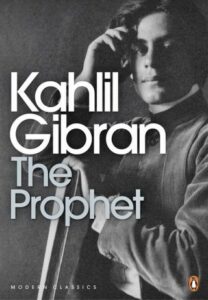Kahlil Gibran on Silence, Solitude, and the Courage to Know Yourself
INSPIRATIONAL, 2 Dec 2019
Maria Popova | Brain Pickings – TRANSCEND Media Service
“In much of your talking, thinking is half murdered. For thought is a bird of space, that in a cage of words may indeed unfold its wings but cannot fly.”
 Something strange and wondrous begins to happen when one spends stretches of time in solitude, in the company of trees, far from the bustle of the human world with its echo chamber of judgments and opinions — a kind of rerooting in one’s deepest self-knowledge, a relearning of how to simply be oneself, one’s most authentic self. Wendell Berry knew this when he observed that “true solitude is found in the wild places, where one is without human obligation” — the places where “one’s inner voices become audible.”
Something strange and wondrous begins to happen when one spends stretches of time in solitude, in the company of trees, far from the bustle of the human world with its echo chamber of judgments and opinions — a kind of rerooting in one’s deepest self-knowledge, a relearning of how to simply be oneself, one’s most authentic self. Wendell Berry knew this when he observed that “true solitude is found in the wild places, where one is without human obligation” — the places where “one’s inner voices become audible.”
But that inner voice, I have found, exists in counterpoise to the outer voice — the more we are tasked with speaking, with orienting lip and ear to the world without, the more difficult it becomes to hear the hum of the world within and feel its magmatic churns of self-knowledge. “Who knows doesn’t talk. Who talks doesn’t know,” Ursula K. Le Guin wrote in in her superb poetic, philosophical, feminist more-than-translation of the Tao te Ching.
Two and a half millennia after Lao Tzu, and a century before Le Guin and Berry, Kahlil Gibran (January 6, 1883–April 10, 1931) — another philosopher-poet of the highest order and most timeless hold — addressed the relationship between silence, solitude, and self-knowledge in a portion of his 1923 classic The Prophet (public library).
When Gibran’s prophet-protagonist is asked to address the matter of talking, he responds:
You talk when you cease to be at peace with your thoughts;
And when you can no longer dwell in the solitude of your heart you live in your lips, and sound is a diversion and a pastime.
And in much of your talking, thinking is half murdered.
For thought is a bird of space, that in a cage of words may indeed unfold its wings but cannot fly.
Echoing Hermann Hesse’s insistence on the courage necessary for solitude, Gibran’s prophet adds:
There are those among you who seek the talkative through fear of being alone.
The silence of aloneness reveals to their eyes their naked selves and they would escape.
And there are those who talk, and without knowledge or forethought reveal a truth which they themselves do not understand.
And there are those who have the truth within them, but they tell it not in words.
In the bosom of such as these the spirit dwells in rhythmic silence.
Complement this fragment of the The Prophet — an abidingly rewarding read in its totality — with sound ecologist Gordon Hempton on the art of listening in a noisy world and Paul Goodman on the nine kinds of silence, then revisit Gibran on the building blocks of true friendship, the courage to weather the uncertainties of love, and what may be the finest advice ever offered on parenting and on the balance of intimacy and independence in a healthy relationship.
_______________________________________
 Brain Pickings is the brain child of Maria Popova, an interestingness hunter-gatherer and curious mind at large obsessed with combinatorial creativity who also writes for Wired UK and The Atlantic, among others, and is an MIT Futures of Entertainment Fellow. She has gotten occasional help from a handful of guest contributors. Email: brainpicker@brainpickings.org
Brain Pickings is the brain child of Maria Popova, an interestingness hunter-gatherer and curious mind at large obsessed with combinatorial creativity who also writes for Wired UK and The Atlantic, among others, and is an MIT Futures of Entertainment Fellow. She has gotten occasional help from a handful of guest contributors. Email: brainpicker@brainpickings.org
Go to Original – brainpickings.org
Tags: Inspirational, Kahlil Gibran, Literature
DISCLAIMER: The statements, views and opinions expressed in pieces republished here are solely those of the authors and do not necessarily represent those of TMS. In accordance with title 17 U.S.C. section 107, this material is distributed without profit to those who have expressed a prior interest in receiving the included information for research and educational purposes. TMS has no affiliation whatsoever with the originator of this article nor is TMS endorsed or sponsored by the originator. “GO TO ORIGINAL” links are provided as a convenience to our readers and allow for verification of authenticity. However, as originating pages are often updated by their originating host sites, the versions posted may not match the versions our readers view when clicking the “GO TO ORIGINAL” links. This site contains copyrighted material the use of which has not always been specifically authorized by the copyright owner. We are making such material available in our efforts to advance understanding of environmental, political, human rights, economic, democracy, scientific, and social justice issues, etc. We believe this constitutes a ‘fair use’ of any such copyrighted material as provided for in section 107 of the US Copyright Law. In accordance with Title 17 U.S.C. Section 107, the material on this site is distributed without profit to those who have expressed a prior interest in receiving the included information for research and educational purposes. For more information go to: http://www.law.cornell.edu/uscode/17/107.shtml. If you wish to use copyrighted material from this site for purposes of your own that go beyond ‘fair use’, you must obtain permission from the copyright owner.
